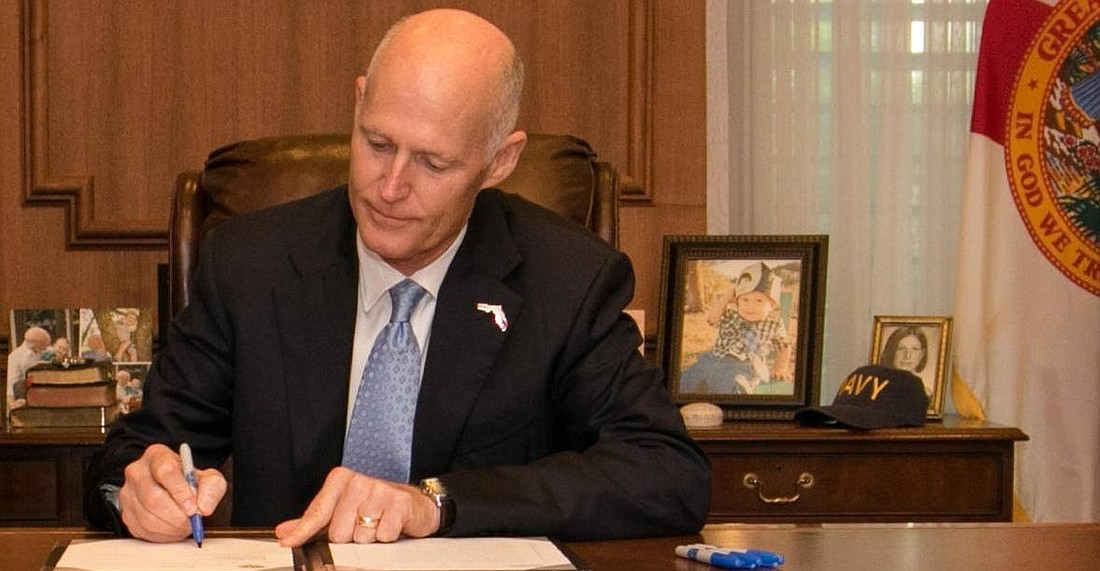- July 26, 2024
-
-
Loading

Loading

FLORIDA – After extending its 2018 session by two days, the Florida Legislature successfully passed 200 bills.
During its two-day extended session, lawmakers also were able to agree on an $88.7 million budget. And in the weeks prior, lawmakers passed major legislation relating to concerns of school safety following the tragedy at Marjory Stoneman Douglas High School in February, workers compensation for first responders diagnosed with Post-Traumatic Stress Disorder, emergency generators for nursing homes and a permanent expansion of the Bright Futures Scholarships funding for college students.
ETHICS. Florida Gov. Rick Scott signed Senate Bill 186, otherwise known as the resign-to-run law. The bill requires elected officials who qualify for federal public office to resign from the office they presently hold if the terms run concurrently.
FIRST RESPONDERS. Lawmakers approved SB 376, which defines posttraumatic stress disorder (PTSD) as an occupational disease for first responders, such as firefighters, police, paramedics and emergency medical technicians. Under this bill, workers compensation benefits are expanded to include PTSD. Before the passing of this bill, first responders were eligible for worker’s compensation for job-related PTSD only if accompanied by a physical injury that kept them from returning to duty.
K-12 EDUCATION. With the passing of House Bill 7055, Florida became the first state to offer vouchers to parents whose students are bullied or physically attacked in their public schools for use toward private-school enrollment. The so-called “Hope Scholarship Program” will be funded by sales taxes from vehicle purchases.
DAYLIGHT SAVING. Gov. Rick Scott signed a bill known as the Sunshine Protection Act that would allow the state to stay in Daylight Saving Time year round, which would place Florida out of pace with the East Coast. The bill, however, will require approval from Congress.
HIGHER EDUCATION. Legislators passed SB 4, a bill permitting students to use certain Florida Bright Futures Scholarship Program awards (The Florida Academic Scholars and Florida Medallion Scholars Award) for summer term enrollment beginning this year.
SCHOOL SAFETY. In a controversial move, lawmakers passed SB 7026 in response to the recent tragedy at Marjory Stoneman Douglas High School in Parkland. The bill appropriates $400 million for school hardening, safety and mental health programs. It also includes changes to background checks, raises the minimum age to purchase a gun from 18 to 21, outlaws the sale and possession of bump stocks, provides measures to keep firearms away from individuals diagnosed with mental illnesses and establishes a voluntary school marshal program allowing certain school personnel to carry firearms on a school campus.
SALES TAX HOLIDAYS. The approved budget also includes a 3-day back-to-school and a 7-day disaster preparedness sales tax holiday, which would allow Floridians to buy hurricane supplies without having to pay sales tax.
CONSUMER FINANCE. HB 386, which was approved by the governor on March 19, has a provision that establishes a maximum delinquency charge for consumer finance loans and allows certain loans to be repaid in periodic installments every two weeks, semimonthly or monthly. The maximum charge is $15 per default if one payment is due in a month; $7.50 for two payments; and $5 for three payments.
NON-NATIVE ANIMALS. SB168, which was also signed off by the governor, establishes a pilot program for the eradication of priority invasive species for the Fish and Wildlife Conservation Commission and specifies procedures for the capture and disposal of animals considered invasive species. The bill defines the term “priority invasive species” to include tegu lizards, red lionfish, common lionfish and devil firefish.
PUBLIC RECORDS. SB 7024, which was unanimously approved by the House, makes the address of a victim of an incident of mass violence exempt from any public records requirement. The bill defines an act of mass violence as an incident in which four or more people,” excluding the perpetrator, are severely and intentionally injured or killed. The exemption provision has an expiration date of October 2, 2023, unless the Legislature reviews and saves the exemption from being repealed before then.
CRIMINAL JUSTICE. SB1392 appropriates $1.75 million for the purpose of creating a centralized criminal justice data collection; provides for the establishment of civil citations and prearrest diversion programs intended to reduce juvenile arrests; and requires the Florida Department of Law Enforcement to adopt rules that provide an avenue for expunging nonjudicial arrest records of minors who successfully complete a diversion program.
NURSING HOMES. Following several heat-related deaths that occurred at a nursing home in Broward County after Hurricane Irma knocked out electricity last September, lawmakers passed a bill requires nursing homes to have emergency generators in the event of a power outage.
MARRIAGE LICENSES. Florida legislators also passed a bill that bans marriage under the age of 17 and requires parental consent if 17-year-olds wish to marry. If the 17-year-old receives parental approval, they are still restricted from marrying anyone more than two years older than them.